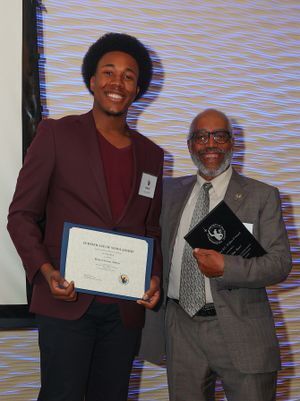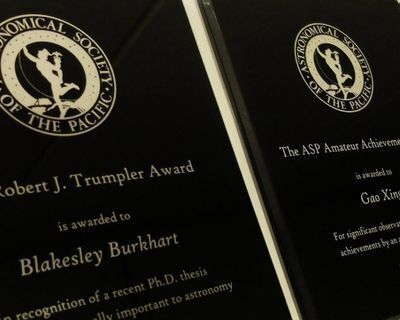Nominations for the 2026 ASP Awards open February 3 through March 31
-
The Arthur B.C. Walker II Award will be given in 2026
Arthur B.C. Walker II Award
The Arthur B.C. Walker II Award, established in 2016, honors an outstanding African American (or member of the African Diaspora) whose research and/or educational efforts substantially contribute to the fields of astronomy, astrophysics, space, or related sciences. The scientist is also recognized as a leader with a strong commitment to mentoring students from underrepresented groups pursuing degrees in astronomy and/or has been instrumental in creating or supporting innovative and successful STEM programs designed to support underrepresented students or their teachers.
The Award also includes an Arthur B.C. Walker II Scholarship which the recipient gives to a student of their choice in support of the student’s academic career goals.

Dr. Gibor Basri to receive the 2024 Arthur B.C. Walker II Award given for outstanding achievement in astronomy and education by an African- American scientist.
San Francisco, California- September 16, 2024 – The Arthur B.C. Walker Award honors an African-American scientist whose research has substantially contributed to astronomy or related fields, and who has demonstrated a substantial commitment to promoting diversity and inclusion in STEM. The 2024 recipient of the Arthur B.C. Walker II Award is Dr. Gibor Basri, Professor Emeritus of Astronomy and former Vice Chancellor for Equity and Inclusion at the University of California, Berkeley for his contributions to our understanding of the nature and origins of low-mass stars and substellar objects as well as his lifelong commitment to promoting diversity in astronomy.
Basri’s early research focused on star formation, discovering evidence for the magnetic activity of very young stars and describing the role the star’s magnetism plays in gas accretion and the formation of the stellar disk. A decade later, Basri turned his attention to very low mass stars and began the search for proof of the existence of theoretically predicted substellar objects, named “brown dwarfs.” Using the sensitivity of the 10-meter Keck Telescope to perform high-resolution spectroscopy on these objects, Basri demonstrated that some of the faint red objects in the Pleiades star cluster are young brown dwarfs. His work also revealed that these objects - which lack the mass to ignite as stars - are rapidly rotating gas giants similar in many ways to the planet Jupiter. Basri next turned his attention to the search for exoplanets, becoming a Co-Investigator for the Kepler Space Telescope mission, which has discovered thousands of extrasolar planets, including numerous Earth-sized worlds in orbit around low mass stars.
Over his long career, Professor Basri has made important contributions to equity, diversity, and inclusion in astronomy and beyond. At the national level, he has served on several influential committees, including being the founder and Chair for the American Astronomical Society’s (AAS) Committee on the Status of Minorities in Astronomy and Co-Chair of the AAS Task Force on Diversity in Graduate Education. But it was during his long tenure at the University of California, Berkeley where he made especially significant and lasting contributions to supporting students and faculty from traditionally underrepresented groups both within the field of astronomy and beyond.
Basri’s impressive service includes membership in the Academic Senate Committee for the Status of Women and Ethnic Minorities, Co-Chair of the Diversity Project Coordinating Committee, and member of the committee to launch the Berkeley Diversity Research Initiative. From 2007 to 2015, Basri was inaugural Vice Chancellor for Equity and Inclusion for the University of California - a systemwide cabinet position responsible for developing a strategic plan, working with the Provost on equitable and diverse faculty hiring and promotion, overseeing initiatives to promote and support programs focused on diversity, and spearheading outreach programs to K-12 schools.
Basri has also made significant contributions to diversity outside of university academics, including participating in a variety of publications and media productions showcasing his own career as an African-American scientist. He has also participated in numerous local and community efforts to support and mentor minority school children and served on the Board of Directors of a variety of science education nonprofits supporting their efforts to promote diversity. In fact, while serving on the Board of the Astronomical Society of the Pacific, Basri led efforts to establish the Arthur B.C. Walker II Award which he now receives.
Join us in celebration of Gibor Basri’s achievements at the in-person ASP Awards Gala on Saturday, November 9, 2024 in Burlingame, CA

Walker Award Scholarship Recipient Robert J. Adams with Walker Awardee Gibor Basri at the ASP Awards Gala
2024 Arthur B.C. Walker II Scholarship awardee is Robert Jahun Adams, a mentee of Gibor Basri. Adams is a student at the Univesity of California, Berkeley with the intention to declare Astrophysics as his major and graduate in 2027. He attended the 2024 ASP Awards Gala to accept his scholarship with his family.
Please contact the Awards team if you have questions about the nomination process

